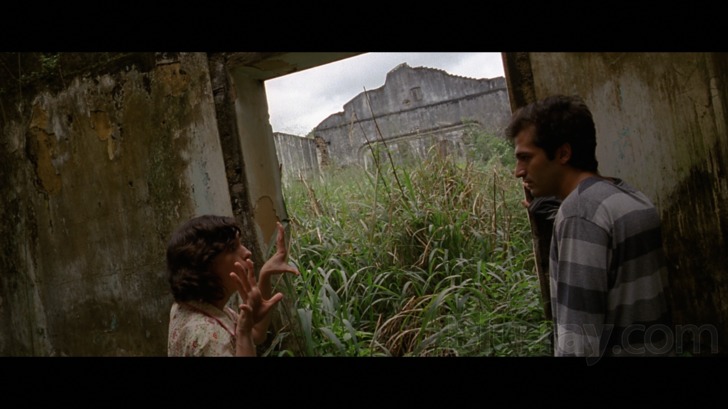Neighboring Sounds Blu-ray Movie
HomeNeighboring Sounds Blu-ray Movie 
O som ao redorCinema Guild | 2012 | 131 min | Not rated | May 21, 2013

Movie rating
7.1 | / 10 |
Blu-ray rating
| Users | 0.0 | |
| Reviewer | 4.0 | |
| Overall | 4.0 |
Overview
Neighboring Sounds (2012)
On a quiet city block in the coastal city of Recife, ruled by an aging patriarch, a recent spate of petty crime has rattled the nerves of the well-to-do residents. When a mysterious security firm is brought in to watch over the neighborhood, it sparks the fears and anxieties of a society still divided by its past.
Starring: Irma Brown, Gustavo Jahn, Maeve Jinkings, Irandhir Santos, W.J. SolhaDirector: Kleber Mendonça Filho
| Drama | 100% |
| Foreign | 82% |
Specifications
Video
Video codec: MPEG-4 AVC
Video resolution: 1080p
Aspect ratio: 2.39:1
Original aspect ratio: 2.39:1
Audio
Portuguese: DTS-HD Master Audio 5.1
Portuguese: DTS-HD Master Audio 2.0
Subtitles
English
Discs
50GB Blu-ray Disc
Single disc (1 BD)
Playback
Region A, B (C untested)
Review
Rating summary
| Movie | 4.5 | |
| Video | 3.5 | |
| Audio | 4.5 | |
| Extras | 3.5 | |
| Overall | 4.0 |
Neighboring Sounds Blu-ray Movie Review
The Discrete Alarm of the Bourgeoisie
Reviewed by Casey Broadwater May 30, 2013Neighboring Sounds might just be the best Brazilian film since 2002's City of God, and on the surface, the two couldn't be more different. Where the latter is a guided tour of Rio's most hellish and dangerous favela—conducted by the country's poorer-than-poor have-nots—the former is a window into the bourgeois lives of the residents of a mostly quiet street in the smaller urban center of Recife, a port city and education hub sometimes referred to as "Brazil's Venice." Both films, though, arrive at a universal view of the country by way of subtext and a specificity in detail. In its observation of solidly middle-class Brazilian existence, Neighboring Sounds is a kind of cinematic haiku, using small, slice-of-life moments to evoke the wider complexities of an entire cultural history—from slavery and an almost-feudal form of capitalism to the lingering de facto caste system that assigns individuals a lot in life based on their skin color and ancestry. The film is the narrative feature debut of critic-turned-writer/director Kleber Mendonça Filho, who actually lives on the very same street where Neighboring Sounds is set and was shot. You can tell that he knows and loves this neighborhood, and his insider's view gives the project a sense of intimacy and authenticity that would be impossible to fake.

Neighboring Sounds opens with a montage of black and white photos from Brazil's early 20th century past: a factory, harried-looking employees, a grand estate, a clear divide between the owning class and the working class. These images, and the ideas contained within them, haunt the remainder of the film, which immediately jumps to the present day, where the demarcation between well-to-do and struggling-to-get-by is still present, seen most in the guilt of the former group—who seem slightly embarrassed to be perpetuating the social stratification—and the quiet resentments of the latter. The ensemble film has no central protagonist, but the closest it comes is João (Gustavo Jahn), a thirty-something, European-educated man who has reluctantly returned to his hometown to manage the real estate holdings of his grandfather, Francisco (W.J. Solha), a white-haired former sugar cane magnate who owns half of the street and is revered as a local patriarch.
When the film begins, João wakes up naked on his couch with Sophia (Irma Brown), a woman he met at a party the evening before—there are still beer bottles strewn everywhere—and they bashfully dash to his bedroom to get dressed when his maid arrives with her grandkids to begin her daily chores. Outside, Sophia's car has been broken into during the night, and when João questions a pair of parking attendants for a nearby apartment about it, they clam up and refuse to snitch. Later, we see one of them keying the Audi of an obnoxious rich woman who walks by chatting loudly on her cellphone, never acknowledging their presence.
There's a sort of South American version of Downton Abbey's upstairs/downstairs dynamic at play here, and the interactions between the two classes give the film a satisfying friction. João is obviously aware of the distinction, and he seems like a nice enough guy, but his attempts at accommodating and relating to his maid's son, for example—who has just landed a job slaving away at a night shift—are awkward and forced. They might as well be from different planets. And yet João himself isn't really comfortable among his own "kind" either; he finds a way to sneak out of a condo residents meeting—a small-scale democracy plagued by bureaucratic gridlock—and he's reluctant to visit his grandfather's now-derelict sugar cane mill, a subtle symbol of bourgeois decay. (The owning class doesn't even produce anymore; they just horde their amassed wealth.) Neighboring Sounds practically hums with Antonioni-esque levels of alienation and middle-class existential uncertainty.
In a separate narrative, we follow Bia (Maeve Jinkings), a housewife whose bored and lonely life further illustrates the film's themes. Caught in a keeping-up-with-the-Joneses cycle of materialistic oneupmanship, she makes sure to buy a larger flatscreen TV than her jealous sister, who lives just down the street. She scores pot from the water delivery guy and lights up inside her room, blowing the smoke into a vacuum cleaner hose to keep the smell from her never-there husband. Essentially trapped at home, she's tormented by the constant barking of her neighbor's dog—which she tries to drug with sleeping pills wrapped in meat—and in a sly commentary on domesticity, she gets off with the aid of a running washing machine when no one's around.
Numerous other characters flit in and out of the film—much as people you encounter in real life do—but special attention is paid to a subplot involving Clodoaldo (Irandhir Santos), a self-made private security specialist who offers the residents of the street a deal; in exchange for a monthly subscription fee, he and his walkie-talkie equipped guards will keep watch over the neighborhood at night to prevent further break-ins. They're a dodgy-looking bunch, and you'd be right to wonder when their true motivations will come to light. As the film winds into its final act, forgotten injustices of the past are exposed, leading to a tense standoff where social worlds collide.
Lest that last sentence fool you, Neighboring Sounds is a very low-key film, one where nearly all the conflicts are in the subtext. Instead of letting the story devolve into Crash-style histrionics—which could've happened, given the racial/class distinctions that are dissected here— director Kleber Mendonça Filho evokes the quiet drama of reality, simple on the surface but infinitely complex underneath. The uncomfortable silences and passing conversations. The everyday encounters. The recognition of status and the way the characters act and react in accordance with their own rigidly defined places in society. This is observational filmmaking at its best—smart and incisive, cutting right down to the truth.
Neighboring Sounds Blu-ray Movie, Video Quality 

In his commentary track, director Kleber Mendonça Filho discusses the difficult pre-production decision of whether to shoot Neighboring Sounds on film or digitally; he finally chose 35mm, knowing that it would perhaps be his last opportunity to shoot in what is now a rapidly disappearing medium. It was a definitely good choice for the project—the organic look of the footage suits the film's mood and themes—and Cinema Guild's 1080p/AVC- encoded Blu-ray transfer is true to source and fairly easy on the eyes. Besides some occasional and barely noticeable white specks on the print, there are no distractions here. Film grain is untouched by noise reduction, edge enhancement isn't a concern, and there are no obvious compression or encode issues. (Banding, macroblocking, pixilation, etc.) If the image isn't ever really tack sharp—there's a lot of inherent softness, particularly in longer shots— closeups typically reveal a decent amount of fine detail in faces and clothing. Color seems true to intent—realistically graded but with a slightly warm cast in most scenes—and both contrast and skin tones appear balanced and consistent. Overall, this is a very pleasing transfer, and well worth checking out on Blu-ray as opposed to DVD and streaming/download options.
Neighboring Sounds Blu-ray Movie, Audio Quality 

With "Sounds" in the title, you'd expect the film's audio to be good, and it really is, with a lossless Portuguese DTS-HD Master Audio 5.1 surround track that's detailed and clear and subtly immersive. If the cinematography is very naturalistic, the sound design introduces some impressionist and even slightly surreal flourishes, calling attention to—and then exaggerating—the sounds of the mundane: the chugging vibrations of a washing machine, the straining of elevator cables, the high-pitched whir of a vacuum cleaner. The best audio moment is probably when Joao and his girlfriend are exploring an abandoned cinema—the sounds of an old 1930s horror movie pipe slowly in, a ghostly echo from another time. The rear speakers are frequently used for hushed ambience—street sounds, bird and insect noises, thunder claps—and everything has a great sense of clarity and presence. Dialogue is clean and balanced, diegetic and non-diegetic music sources sound great, and there's no hissing, peaking, or any other audio issues. The disc also includes a DTS-HD Master Audio 2.0 stereo fold-down, as well as optional English subtitles.
Neighboring Sounds Blu-ray Movie, Special Features and Extras 

Cinema Guild has pulled out all the stops here, loading up the disc with an audio commentary and four of the director's short films, which feature many themes that reappear in Neighboring Sounds:
- Audio Commentary: A scene-specific track with director Kleber Mendonça Filho, who warns up front that he's wary about the very idea of commentary tracks—he doesn't like it when a movie's sense of mystery is spoiled—but goes on to give an eloquent two-and-a-half-hour dissection of the film, its production, and its thematic undercurrents. Recorded on February 19th, 2013. In English.
- The Little Cotton Girl (SD, 5:56, 2003): An homage to childhood nightmares of a ghost known throughout Brazil as "The Little Cotton Girl."
- Green Vinyl (HD, 16:23, 2005): A "sweet horror film for children," adapted from a Russian fairy tale. Told in a series of photographs, La Jetée-style.
- Eletrodomestica (HD, 22:46, 2005): A short film "about sex, control and pleasure in '90s Brazil." A lot of this short clearly made it into Neighboring Sounds.
- Friday Night, Saturday Morning (HD, 15:38): A simple "man-meets-woman" love story that plays out mostly over a cellphone conversation.
- Deleted Scenes (SD, 1:51): Three short cut scenes, one about a sad cat on his way to be castrated.
- Theatrical Trailer (HD, 2:02)
- Also from Cinema Guild (HD): Trailers for Leviathan, Night Across the Street, Angelica, The Day He Arrives, Patience, Once Upon a Time in Anatolia, The Turin Horse, and Aurora.
- Booklet: Inside the case you'll find a two-page booklet with an essay by film curator James Quandt.
Neighboring Sounds Blu-ray Movie, Overall Score and Recommendation 

Neighboring Sounds has caught some criticism from IMDB.com commenter types for being slow and boring—a film in which "not much happens"—but director Kleber Mendonça Filho is out to evoke reality rather than entertain with melodrama. His debut feature is built out of the stuff of honest-to-goodness life. Small interactions. Passing conversations. People who come and go, in and out of the characters' lives, some never to be seen again. Under this surface-level simplicity and truthfulness, though, the film's undercurrents crackle—polite discrimination and racial guilt, the aftereffects of colonialism and the divide between the bourgeoisie and the servant class. This is a rich film, ideas-wise—without ever being blatant or pedantic—and if that's "boring," then those who appreciate nuanced and thought-provoking filmmaking will be happy to be bored by Neighboring Sounds. Highly recommended!
Similar titles
Similar titles you might also like

Biutiful
2010

Transit
2018

Stray Dogs
郊游 / Jiao you
2013

Horse Money
Cavalo Dinheiro
2014

Dheepan
2015

City of God
Cidade de Deus
2002

El Norte
The North
1983

Two Days, One Night
Deux jours, une nuit
2014

Code Unknown
Code inconnu: Récit incomplet de divers voyages
2000

The Secret of the Grain
La graine et le mulet
2007

Alambrista!
¡Alambrista! / The Illegal
1977

And Life Goes On
زندگی و دیگر هیچ / Zendegi va digar hich / Life, and Nothing More...
1992

Happy End
2017

La Promesse
1996

Film Socialisme
2010

Muriel, or the Time of Return
Muriel ou le temps d'un retour
1963

Touki Bouki
1973

The Class
Entre les murs
2008

Cemetery of Splendor
2015

White Material
2009